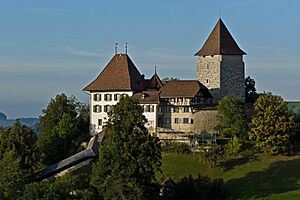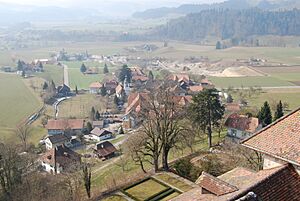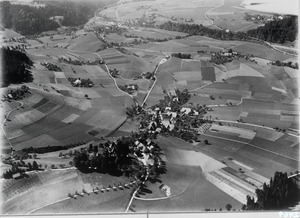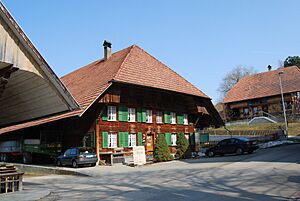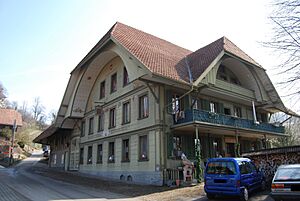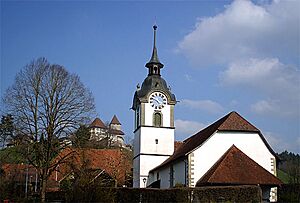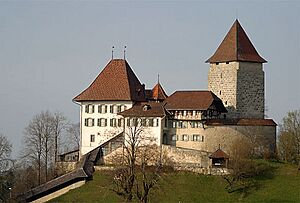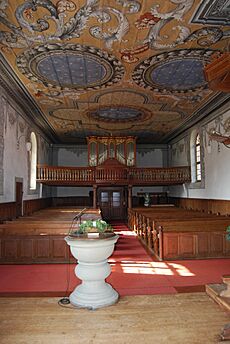Trachselwald facts for kids
Quick facts for kids
Trachselwald
|
||
|---|---|---|
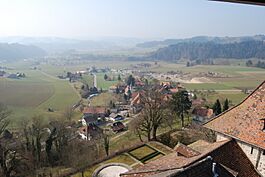 |
||
|
||
| Country | Switzerland | |
| Canton | Bern | |
| District | Emmental | |
| Area | ||
| • Total | 15.96 km2 (6.16 sq mi) | |
| Elevation | 685 m (2,247 ft) | |
| Highest elevation | 1,200 m (3,900 ft) | |
| Lowest elevation | 660 m (2,170 ft) | |
| Population
(Dec 2020 )
|
||
| • Total | 954 | |
| • Density | 59.77/km2 (154.82/sq mi) | |
| Postal code |
3456
|
|
| Surrounded by | Langnau im Emmental, Lauperswil, Lützelflüh, Rüderswil, Sumiswald | |
Trachselwald is a small town, or municipality, located in the beautiful Emmental region of Switzerland. It's part of the Canton of Bern. This charming Swiss town is known for its rich history and stunning natural scenery.
Contents
A Look at Trachselwald's History
The name Trachselwald means "Woodturner-Forest." It was first written down in 1131 as Trahselwalt. The village grew up around Trachselwald Castle. Over time, different noble families owned the village and castle. These included the barons of Trachselwald, then Rüti bei Lyssach, and later Sumiswald. In 1408, the city of Bern bought the village. The castle then became a place where a local leader, called a sheriff, worked.
In 1574, a big fire destroyed much of the village. Later, during the Swiss Peasants' War in 1653, something important happened here. On April 3, 1653, a meeting took place at the Tanne inn. This was the first public appearance of Niklaus Leuenberger, a leader of the peasants. Sadly, he was later executed at Trachselwald Castle on August 27 of the same year.
The village church was first mentioned in 1275. It was also destroyed in the 1574 fire. The church was rebuilt in 1668. Its bell tower was first added in 1464 and got its current look in 1786.
Exploring Trachselwald's Geography
Trachselwald covers an area of about 15.98 square kilometers (6.17 square miles). A large part of this land, about 56.5%, is used for farming. Forests cover another big part, about 38.3% of the area. The rest of the land is used for buildings, roads, or is made up of rivers.
The town is located in the Emmental region. Interestingly, the village of Trachselwald is split between two municipalities. The northern part is in Trachselwald, while the southern part is in Lützelflüh.
In 2010, Trachselwald joined a new administrative area called Verwaltungskreis Emmental. This change helped organize local government better.
What Trachselwald's Coat of Arms Means
The official symbol, or coat of arms, of Trachselwald is quite simple. It shows a green fir tree with a gold trunk. In the top right corner, there is a gold star. This design helps represent the town's identity.
People and Population
Trachselwald has a population of about 995 people as of 2012. Most people in Trachselwald speak German. In fact, about 98.7% of the population spoke German as their first language in 2000.
In 2013, the population was almost evenly split between males and females. About 52% were male and 48% were female. Many people who live in Trachselwald were also born there. In 2000, about 47.4% of the residents were born in Trachselwald.
The population includes a good mix of ages. In 2012, children and teenagers (ages 0–19) made up 23.3% of the population. Adults (ages 20–64) were 58.6%, and seniors (over 64) were 18.1%.
The number of people living in Trachselwald has changed over the years. Here's how the population has looked historically:

Trachselwald's Economy and Jobs

In 2011, Trachselwald had a low unemployment rate of 1.37%. This means most people who wanted to work had jobs. The town has different types of jobs:
- Primary Sector: This includes jobs like farming. In 2011, 197 people worked in this area.
- Secondary Sector: This involves manufacturing and construction. About 46 people worked here.
- Tertiary Sector: This covers services like shops, restaurants, and healthcare. About 128 people worked in this sector.
Many people who live in Trachselwald also work there. In 2000, 245 workers lived and worked in the municipality. For those who travel to work, about 52.8% used a private car.
Important Heritage Sites
Trachselwald is home to two very important historical sites. The village church and Trachselwald Castle are both listed as Swiss heritage sites of national significance. This means they are very important to Switzerland's history and culture.
The beautiful baroque church was designed in 1685. The castle has parts that date back to the 12th century. Today, the castle serves as the governor's office for the Trachselwald district. There is also a Zither culture museum in Trachselwald. It opened in 1999 and moved to Trachselwald in 2003.
Religion in Trachselwald
According to a 2000 survey, most people in Trachselwald belong to the Swiss Reformed Church, about 88.6%. A smaller number, about 2.3%, are Roman Catholic. There are also a few people who belong to other Christian churches, or are Muslim, Buddhist, or Hindu. Some people do not belong to any church.
Education for Kids and Teens
In Trachselwald, many people have completed higher education. About 57.7% of the population has finished non-mandatory upper secondary education. Also, 13.9% have gone on to higher education, like university.
The school system in the Canton of Bern starts with one year of non-required Kindergarten. After that, students attend six years of Primary school. Then, there are three years of lower Secondary school. Students are grouped based on their abilities. After lower Secondary, students can choose to continue their schooling or start an apprenticeship.
In the 2012–13 school year, 95 students attended classes in Trachselwald. There were 19 students in kindergarten and 55 in primary school. Some students from Trachselwald also attended lower secondary schools in nearby towns.
Famous People from Trachselwald
- Gottlieb Sigmund Gruner (1717–1778): He was a cartographer and geologist. He wrote the first detailed description of Switzerland's snowy mountains.
- Leah Hirsig (1883–1975): She was a Swiss-American woman known for her connection to the writer and occultist Aleister Crowley.
See also
 In Spanish: Trachselwald para niños
In Spanish: Trachselwald para niños





